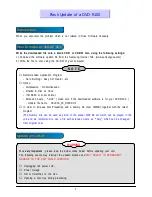
T 587 Blu-ray Disc Player
• Plays BD-ROM,
BD-R, BD-RE
• Plays DVD, DVD±R,
DVD±RW
• Plays Audio CD,
CD-R/- RW
• Decodes MP3, WMA,
DiVX, JPEG
• Network BD Live
(Profile 2.0) via
Ethernet
• BD Java (Profile 1.0)
• Picture-in-picture
(Profile 1.1)
• Resolution up to 1080p
24/60 over HDMI
• Upscales DVD to
1080p over HDMI
• HDMI Output with
support for Deep
Colour and xvYCC
Extended Colour Space
• Component Video
Output up to 1080i
• Composite Video
Output 480i/576i
• Linear PCM
(uncompressed)
via HDMI
• Dolby TrueHD (decoded
to LPCM or encoded
bitstream)
• DTS HD/MA (5.1
decoded to LPCM or
encoded bitstream)
• Dolby Digital and Dolby
Digital Plus via HDMI,
Optical or Coax
• DTS via HDMI, Optical
or Coax
• Analogue 2 channel
downmix
• MHP support (Multi-
media Home Platform)
for interactive video
• Simultaneous playback
of HD and SD video
• USB 2.0 supports
memory stick playback
of audio and pictures
> F E A T U R E S
> P O S I T I O N I N G
The T 587 brings NAD’s penchant for performance to the exciting new Blu-ray Disc format. NAD is one of a handful of brands to bring a Profile 2.0
Blu-ray Disc Player to market at this time.
Brimming with the latest features like BD Live Network connectivity, the T 587 offers, for the first time,
a true High Definition source for digital Home Theatre systems.
> D E T A I L S
About Blu-ray
Blu-ray is the latest version of the popular 5” optical
disc format that began with the CD. Blu-ray was made
possible by the development of a practical violet laser
whose light wavelength is shorter than the red lasers
used by CD and DVD players. This allows for a more
focused spot that can read smaller and more densely
packed pits that generate the “digital 1s and 0s” that
represent the picture and sound that is then decoded
by the player for viewing.
Blu-ray Disc has over 5 times the data capacity of
DVD. HD programs are protected by multiple layers
of DRM (Digital Rights Management or ‘Copy
Protection’) and can only be transmitted from Player
to TV Display by the encrypted HDMI interface.
High Definition playback requires that the entire
signal path be capable of digital bandwidth of 150
Megahertz. This means you’ll need the very latest
TV and AV Receiver as well as Category 2 HDMI
cables. Be sure the entire system supports “1080p”.
Get it all right and the result is stunning... especially
on screen sizes 50” and larger!





















